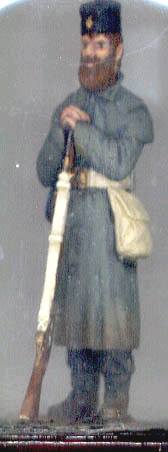
The Subject...
The figure above depicts an Infantry Regiment Private from the Crimean
period, closely resembling the way Robert Dunne, the subject of this
website, would have dressed during 1854/55.
It is difficult to establish
with certainty the exact year of Dunne's birth, but it is probable that
an estimate of the mid-1830s would not be far off the mark. Robert was born in
Ireland, and in 1853 joined the British Army, like many of his fellow countrymen.
The following year he went with his regiment to fight the Russians "in the
East", and stayed in the Crimea until 1856. After service in the Crimea, he
again served Queen and country in India, Abyssinia and perhaps even Afghanistan,
before finally settling in India, initially working on the Sub-Continent's
expanding railway network. In later life he set up his own business in Central
India and his descendants still live there.
Robert Dunne died in 1900 leaving a widow, a son, a grandson and a thriving
business.
A reason why...
I became interested in researching the life of Robert Dunne shortly after marriage to his
great-great-grand-daughter in India in 1991. On our return to the UK many hours were spent in the Public Records Office, libraries and bookshops, searching through books and historical
reports relating to the Crimean period, and I also joined the Crimean War Research Society. My intention was to research and
record as accurately as possible the likely role Dunne played in the events he had lived through.
There are still many gaps and my research continues, but I hope at least that
I have been able to keep factual inaccuracies to a minimum; I will welcome any
corrections and constructive criticism.
My interest and imagination were soon triggered when I was shown the
collection of correspondence and papers relating to Robert Dunne.It was clear
he had led a very varied and interesting life. It is unfortunate that the
correspondence, which mainly emanates from his step-father in Ireland, only
begins towards the end of Robert's army service in India, and three years after
the Crimean War. Nevertheless the letters are of interest for their literary
style and give a glimpse of Irish society and an insight into the nature of
the "God-fearing" personalities of the period.
The letters frequently reflect Robert's step-father George Rafferty's
incredulity at the mad-cap schemes and lack of ambition shown by his
step-son.The polite yet often acerbic turn of phrase used to demonstrate this
would have left Robert in no doubt that he was being severely reprimanded, but
it is clear that he paid it no heed. There are snippets of family news relating
to his mother's health and some gossip from the local Drogheda neighbourhood.
Occasionally there is a reference to military or other activity in India as seen
from the UK.Although generally the letters do not refer to events of any
historical significance, they nevertheless make interesting reading.
The fact that Dunne witnessed not just one but several noteworthy events during
the heyday of the British Empire seemed particularly compelling; I thought his
story worth recording, for my own interest as well as for future generations of
the Dunne family.
This is not a new perspective on the events at which he was present.
There will be little new material to interest the serious student but I have
tried to include a little background of the events to give an idea of what
Dunne may have experienced. The letters and items mentioned in the narrative
still exist, though the letters featured here are obviously recently typed
copies, not the originals.
Wherever possible I have included references to Public Records Office (PRO)
Documents, though some records I viewed would have added only small
factual details to the narrative, e.g. an extract from the May 1857 Regimental
Pay List:
"One day deducted - in cells"! (WO12.2240). No further details were available
and only fictional embellishment could have added background to this rather
terse annotation.
The Dunne Family...
This particular branch of the Dunne family originated in Drogheda and Dublin,
Eire. Robert appears to have been an only child; he subsequently
had a step-father, George William Rafferty, whom Mary Jane Dunne had married
in October 1848, when Robert was probably in his early teens. His cousins,
Robert and Thomas Dillon, also from Drogheda, emigrated to the USA and settled
in Philadelphia. Robert sometimes exchanged correspondence with Robert Dillon
from the 1870s onwards and approximately a dozen of these have survived. The letters
centre mainly around their respective business ventures and are reproduced
here.
The Dunne family still live in Madhya Pradesh, in the same town in which Robert
settled in 1882, and the lime kilns with which he started his business are
still in operation.
Continue to main story: "The Early Years"
© N.S.Chadwick
2002
It is difficult to establish with certainty the exact year of Dunne's birth, but it is probable that an estimate of the mid-1830s would not be far off the mark. Robert was born in Ireland, and in 1853 joined the British Army, like many of his fellow countrymen. The following year he went with his regiment to fight the Russians "in the East", and stayed in the Crimea until 1856. After service in the Crimea, he again served Queen and country in India, Abyssinia and perhaps even Afghanistan, before finally settling in India, initially working on the Sub-Continent's expanding railway network. In later life he set up his own business in Central India and his descendants still live there. Robert Dunne died in 1900 leaving a widow, a son, a grandson and a thriving business.


